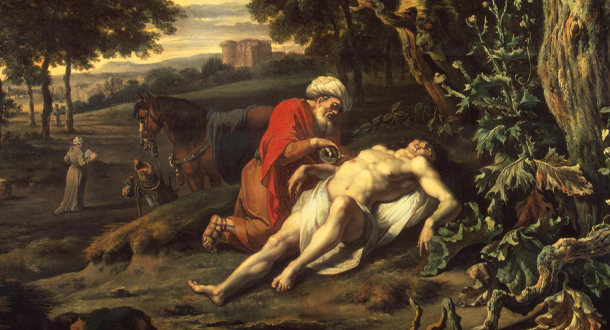
Scripture:
Reflection:
Today we encounter one of the best known of Jesus’ parables – that of the Good Samaritan – a parable that Pope Francis suggests should be the model for the church in action in the world today.
The parable certainly encourages us to be alert to those who need our care and calls us to put into action the deep love and compassion God has planted in our own hearts. However today let us reflect on one of the hidden dimension of this story. Apart from the obvious messages, what other ‘colours’ or messages did Jesus paint into this word-picture of compassion in action.
We might begin with the image of the lone traveller. I can image the first audience gasping in shock at the mere thought of someone setting out alone along this road – notorious as it was for robbery (as the story itself suggests). One did not venture along this route without companions and most travelled in caravan.
So, in the figure of a lone traveller we might well see an image of the many in our society who try to live life ‘by themsleves’. The capacity for self-actualisation, independent thought and resilience is one thing, but loneliness and isolation in life is another more dangerous and damaging reality. It is said we have an epidemic of loneliness in western society these days, and perhaps our lone traveller might just represent those people in our midst today. He calls our attention to those who feel they are without support, without networks of friends and good companions in life.
In fact, there is a lot of isolation in this story isn’t there? For as the story unfolds, we see that the Levite, the Priest and indeed the Samaritan all appear to be travelling alone along this road.
Such aloneness is a concern, and we can take from the parable a clear reminder to be of service and outreach to those who face life’s struggles by themselves.
The response of the Samaritan, immediate and far above what might be expected, tells us that there are dramatic situations of real and acute need that must find a response in the moment, just as his provision of money and the promise of a return also tell us that an effective response also calls for ongoing care.
The story Jesus told also ends with a question – one for our reflection too. It is not so much that the wounded traveller is our neighbour – rather that Jesus wants us to be a neighbour to all who are in need. Being neighbour is a giving role, not a receiving one.
Let us, “Go and do likewise.”
Fr. Denis Travers, C.P., is a member of Holy Spirit Province, Australia.
